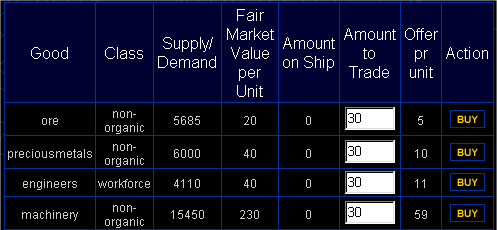|
Trading is the basis of Merchant Empires. With trading come
experience points, enabling you to use advanced ships, and most
importantly, money to buy them.
The idea of trading is simple: buy a good on a planet cheaply and
sell it at another for a profit.
When the old empire collapsed, the planets were thrown into anarchy. In the resulting
power struggles, the advanced planetary industries were destroyed. Therefore, as order
was slowly being restored, the main part of economy again shifted to trading basic goods,
such as ores, water and food.
But the industries are slowly beginning to grow again, and they need goods that the planets
on which they are based cannot provide. That is where you, the player, come in. Acting planetary
governors will post petitions for growing industries. When enough goods of the required type are
delivered, the petitioner that won, builds the industry, which soon starts producing a new, more
complex (and potentially more valuable) good. After a petition has won, the governor presents a
completely new list of petitions.
However, the newly built industry still requires the base goods that were required in the petition,
in order to continue making the new product. The latest efficiency surveys show that the following
formula is very accurate for calculating the production rate:
(amount of goods brought)/(amount of good types needed for something)
Example:
Planet Andromeda has just upgraded and gains machinery. It is already producing steel so to
maintain supply you deliver some plastics (machinery is created from steel, plastics and energy).
If you were to deliver 300 units of plastics, the planet would produce 100 units of steel and store
them in supply.
A planet in current sector screen appears like this:

The three links in the current sector planet picture take you to three different
port interaction screens:
- Upgrade

In this screen, you support the petition which you feel is most appropriate for the future development of the
planet. The needed for upgrade field shows which goods and how much of each the petitioner needs
to establish an industry.
- Buy

All the goods that you can buy are placed here. You can buy as long as the supply level is above 0.
- Sell

On this screen, you sell goods to the planet. You can sell all goods, except the ones
the planet is producing. However, only the goods needed to supply the planetary industry
will turn a profit.
Other factors (that affect the price):
(Most important): Distance
The distance rating is the most important element in getting more money from
a trade. When two planets are close together, i.e. neighboring, you get the least
money and experience points for a sale. When the distance between a planet
supplying and the planet buying a good increases, so do the profits and experience
gained.
Note that it doesn't matter if you buy a good at one end of a
galaxy and sell it at the other, the distance is calculated from the
nearest planet selling the good.
Cargo space
It is only natural, that you get more money (and experience) for
600 units of cargo than for 120, isn't it?
Due to the chaos in the galaxy these days, random identity checks are performed every
once in a while, surveys show roughly every 25 trades. The planet owner sends a query,
and you have to enter the proper code. Upon transmitting an improper code, you are
detained and questioned, resulting in a loss of 5 turns for every incorrect code entered.

|




